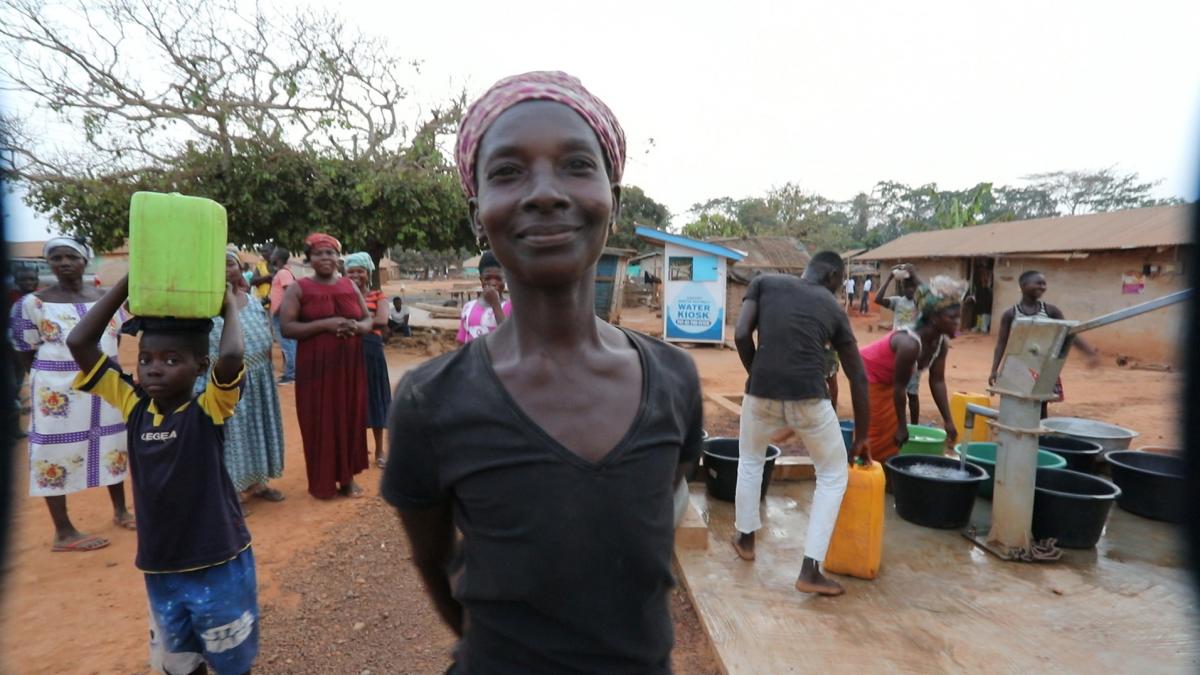Two new videos show how a district-wide partnership is transforming water coverage and lives.
Published on: 23/02/2021
Robel Lambisso Wahimso, Ghana WASH Program Manager for World Vision, reflects on the success of the Asutifi North Ahonidie Mpuntuo (ANAM) initiative to deliver WASH access to everyone in the district by 2030. “We have all joined our hands towards achieving a common agenda under the umbrella of the Universal WASH master plan. It is a unique experience for World Vision. I believe it is a unique experience for the other partners as well.”
James Ata-Era, District Development Planning Officer confesses that the District Assembly has been amazed at the impact as the initiative they lead brings safe water to communities, who are willing to pay for it. “The number of requests for maintenance of boreholes to the Assembly has reduced drastically. We ourselves are amazed.”

Photo caption: Water vendor in Agravi, Asutifi North, Ghana. Peter McIntyre/IRC
The two videos focusing on Asutifi North each look at different aspects of the work. Commitment and leadership on the road to universal WASH coverage details achievements and reflections of those leading the initiative. Asutifi North partners join hands to reach a common goal gives partners space to reflect.
The Hon. Anthony Mensah, District Chief Executive, sees the ability of the district to deliver safe water as a key indicator of good government. “I am going to be measured based on my performance and part of it will be how I was able to deal for people to get potable and clean water.”
Joseph Ampadu-Boakye, Safe Water Network Sector Engagement and Partnerships manager, believes this approach could reach 3.2 million people in small towns and peri-urban across the country, provided the lessons are taken on board.
“Local government authorities are willing to invest in water services, provided as partners we are also willing to invest a lot more time and effort in taking them through a process where they completely understand what it is that they are putting their resources into. We need to understand the fact that they are duty bearers and for every single Cedi or dollar that they spend they have a responsibility of being able to explain to their constituents the reason why they are making that investment.”
IRC plays a hub role in this partnership. Jeremiah Atengdem, IRC Ghana WASH Expert said, “In a good working partnership you need to have backbone organization to drive change, ensure we have a master plan everyone believes in and is committed to ensure that at every point on the way partners are keeping their eyes on the ultimate vision which is to achieve universal WASH access.”
Two other videos that tell the transformational story of the Asutifi North District initiative, documented under the National Development Planning Commission (NDPC) good practice for WASH in Ghana cases include:
looks at the impact in three communities. In Wamahinso Town it contrasts the peace and calm at water points today with the near riots in 2018 when pumps ran dry. In Agravi village it shows how women have been relieved of a half kilometre uphill struggle every day with water from a contaminated open well. In Panaaba, Chief Nana Attakorah Amaniampong coined the phrase “Where World Vision goes, water flows” to sum up the transformation of his village. Water vendor Doris Bosompimaah even dreams of selling iced water from her stall.
shows how water in schools reduces absenteeism and improves concentration in class. In Gambia no 1, Vivian Kumah, nurse in charge of the CHPS health centre can at last practise effective infection control. “Doing childbirth without water is not safe,” she says bluntly.
Dr Kodjo Mensah-Abrampah, Director-General of the National Development Planning Commission in Ghana says the whole country must learn from these experiences.
“I think that is the path that we need to go if you want to make an effect. Asutifi is not a special area in the country but it has now suddenly become the Mecca for good water management and how a team and a group can work together to responds to some of these areas.”